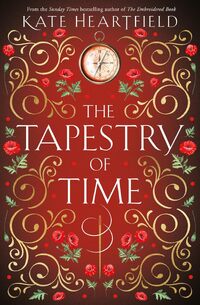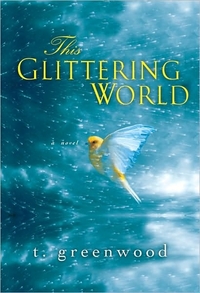 THE TAPESTRY OF TIME |
 Sunshine, secrets, and swoon-worthy stories—June's featured reads are your perfect summer escape. |

Purchase
Zebra Fiction Excerpt of This Glittering World by T. GreenwoodWinter came early to Flagstaff that year. Ben hadn’t split the firewood that lay in a cluttered heap in the driveway. He hadn’t cleaned out the chimney or bought salt to melt the snow from the sidewalk in front of the house. Sara hadn’t gotten the winter coats out of storage, hadn’t taken down the artificial spiderwebs and plastic decals she’d hung in the windows for Halloween. The harvest dummy sat ill-prepared and coatless on the porch. The jack-o’-lanterns hadn’t even started to bruise and rot when the first storm brought twelve inches of snow. They weren’t prepared. It came while they were sleeping, as Sara dreamed of something that made her scowl and Ben dreamed of something that softened his features into a face he might not recognize in the mirror. This dreaming face was the face of his boyhood. Only in sleep did the hardness of the last twenty years subside. At thirty, his face already bore the quiet evidence of things gone wrong. It was etched in the fine lines in the corners of his eyes, in his clenched jaw, and in his worried brow. But in sleep, when he did sleep, the road map tracking the journey from possibility and promise to anger and ennui and disappointment almost disappeared. The house was cold, though neither of them knew it. Sara insisted on sleeping with a heavy down comforter year-round. Usually, Ben slept on top of it while she lay nestled like a small bird underneath its feathers. But tonight, maybe sensing the coming storm, he too had hunkered down, his dog, Maude, at his feet. The one window in their room, the one that would have revealed the falling snow, was veiled in the heavy curtains Sara had bought to keep out the morning sun and prying eyes. She was worried about the neighbor, Mr. Lionel, who she claimed looked to her like he might be dangerous, a pedophile or worse. The one who spent hours rubbing Turtle Wax into his old blue Ford Falcon. The one Ben made sure to wave and nod to each time they both happened to be outside in their yards at the same time, as if this would make up for Sara’s paranoia. The furnace was set to OFF. The woodstove was bone cold. Sometime during the night, as they slept, it began to snow. And when it snows in Flagstaff, it doesn’t stop until the entire world is sheathed in white. Ben had lived here long enough to have experienced this, to have gone to sleep at night and awoken to a world obscured. Ben moved to Flagstaff eight years ago because of the snow. He’d just graduated from Georgetown and was done with the city, done with its grit and grime and heat. He planned to get his Master’s, and maybe even his PhD, in history, and he wanted to go somewhere clean and quiet for grad school. Somewhere without steaming streets and honking horns and subways always rumbling under his feet. Then he cracked a tooth on a chicken bone on a Friday afternoon and wound up in the dentist’s office, where an issue of Arizona Highways lay buried beneath a pile of other magazines. If the dentist hadn’t been running so late, Ben might have simply finished the article in Newsweek about the missing girl in Utah and not even seen the picture of the San Francisco Peaks. He might never have seen the turquoise sky with the ocean of clean white snow beneath. He might never have felt that strange tug in his chest, amplified by the ache in his jaw, and decided then and there that this is exactly where he belonged. Here, snow was no different from air or breath. It was simply part of the landscape, part of how one lived. And he loved everything about it: the cold pristine white of it, the soft sharpness of it. The crunch and glisten. He was never as happy as he was when it snowed, each storm like a small baptism. He knew, even after he had finished his dissertation, he wouldn’t leave, couldn’t leave. And so here he was eight years later, an underpaid adjunct and part-time bartender. Though all of it (the financial worries, the late hours, the work overload) was softened by the presence of snow. But still, he wasn’t expecting this. Winter, while a welcome guest, had shown up early to the party. There had been no sign of a storm when they went to bed, Sara angry and Ben too drunk to care. They’d gone to a Halloween party at Sara’s best friend Melanie’s A-frame in Kachina Village the night before. He’d had too much to drink. Spent most of the party listening to a girl playing Jane’s Addiction songs on an acoustic guitar. Sara was furious, but she didn’t say so; she’d simply grabbed her coat and stood there waiting for him. They’d driven home in silence, gone to bed without saying good night. And while they slept, Sara fitful and Ben oblivious, icy fingers curled around their ankles and hips. Winter crept in. It wasn’t the cold that woke him. The shiver through the old window. The icy breath that skipped across his exposed cheek. It was Maude, his seventy-pound golden retriever, nudging, prodding. He ignored her for a moment, feeling shaky and too hungover to open his eyes. But she persisted, whimpering in his ear. “Hush,” he said, and quietly got out of bed so as not to wake Sara, whose face had softened by now, the dream apparently having passed. He hoped that her anger also might fade by the time she woke. The floors were icy. He grabbed the pair of socks he’d worn the night before, some long underwear, and a sweater that was crumpled up on the floor. But it wasn’t until he went into the dark living room and pulled back the curtains that he saw the obliterated sky. His head pounded, but his heart trilled. Maude knew too and raced to the door, anxious to go out and piss and play in the snow. “Hold on, girl,” he said, his voice crackling like a fire.“Let me get the coffee on first.” While the coffee bubbled and hissed and Maude romped in the backyard, sinking into the wadding of snow, Ben backtracked through his fuzzy recollections of the party, tripping and stumbling over the conversations until he remembered the girl, the guitar, and Sara standing over him, pissed. He remembered that the girl was very pretty, dressed up like Dorothy with sparkly red shoes, and that she had one slightly lazy eye which, for some reason, captivated him. He also remembered wanting only to curl up inside the hollow mahogany body of the instrument and listen to the music from the inside out, and he recalled whispering this to the girl. This is what Sara must have seen. Shit. It was Sunday, a day that should be easy, and already he knew he’d have to spend the day tiptoeing, making amends for this transgression and all the others she was sure to bring up. He knew the Sunday paper wouldn’t be there yet. Theirs was the last house on the delivery route, he was convinced, because the paper almost never arrived before seven. He looked at the clock on the stove: 6:52. Maybe just this once it would be early, maybe today would be his day. The thermometer hanging on a tree outside the kitchen window read twenty-five degrees. He found his winter coat in the back of the coat closet and his Sorels buried deep inside as well. He yanked them on and opened up the front door to the blizzard. From the doorway, he contemplated the journey to the sidewalk for a newspaper that was likely not even there, and almost turned around to go back inside. But then the blue sliver of something in the distance caught his eye, and he imagined his newspaper lying swaddled in plastic. So he pulled his hat down over his ears, shoved his hands in his pockets, and trudged through the snow, squinting against the icy shards that seemed to be falling sideways. But it was not his paper. It took a minute before what he saw registered, before his brain, thick with the hangover and disbelief, could make sense of the image before his eyes. The absurdity of it was what hit him first, and he almost laughed; this would later make him wonder if it was evidence that he was, as Sara would suggest time and time again, incapable of empathy and capable of the most frightening cruelties. At first he just thought the man was sleeping. He was curled on his side, facing the street, hands tucked quietly between his knees. But he wasn’t dressed for the cold: just a flannel shirt tucked into a pair of jeans held up by a concho belt. No coat, no hat, no gloves. Only a pair of Nike basketball sneakers on his feet. His black hair in a braid, curling like a snake into the snow. There was a half inch of fresh powder covering his entire body. Ben squatted down next to him and touched his shoulder, as if he could simply wake him up.“Hey,” he said. The wind admonished Ben, and then hit him hard in the chest, like an angry fist. It was twenty-five degrees outside. The man didn’t move, not even with a second nudge, so Ben started to roll him over, pulling his shoulder until his body yielded. He was big, maybe six foot two, a couple hundred pounds. And then the man was on his back and Ben stood up, stumbling backward. “Jesus Christ,” Ben said.“Shit.” Both eyes were sealed shut, crusty with blood and circled in blue-black. His nose was crooked, bent at an impossible angle, with dried blood in two lines running from each nostril to his lip. His bottom lip was blue and swollen, split in the center. And slowly, a fresh stream of blood began to pour from his ear, the crimson blooming like some horrific flower blossoming in the snow. He should have run back into the house then, gotten Sara. She was a nurse, for Christ’s sake. But he was suddenly paralyzed, quite literally frozen in place as he realized: He knew this guy. Of course, he couldn’t remember his name. . . . Jesus, why couldn’t he ever remember a goddamned name? But he knew him. He was the kid who came into the bar almost every single night to shoot pool. Ben knew he couldn’t be old enough to drink, but he never carded him, because all he ever ordered were Cokes. And because Jack’s served food, minors were allowed in as long as they didn’t sit at the bar. The kid always sat alone in a booth, eating cheese fries, waiting for someone to show up at the tables. He was a good pool player. Didn’t talk shit like some of the idiots that came into the bar. A gracious winner and loser. Jesus fucking Christ. Ben dropped back down to the ground, feeling the cold wet seeping through the knees of his jeans. He pressed his hand hard against the kid’s chest, waiting. When he felt nothing but the resistance of bone, he leaned over and pressed his ear against his chest, listening. He didn’t know what he expected, but it wasn’t this. It wasn’t the silence that was suddenly as loud as drums. And the harder he pressed his ear against him, the louder the blood in his own ears got. When it snows like this, the sun never rises. The air simply turns lighter and lighter until things come into focus. Until there is clarity. Ben stood up again and shoved his hands into the pockets of his coat, looking for his cell phone. Shit, where the hell did he put his phone last night? He was afraid to leave the kid there in the snow, as if something worse than what had already happened could happen to him now if Ben left him alone. He thought of Sara, sleeping angrily in the bedroom, and knew that he had to wake her. She would know what to do. He needed to call 9-1-1. And so as the sky filled with hazy white light, he backed away from the kid whose head was surrounded now by a bloody halo, back through the blizzard, back to the house. Even before the ambulance arrived, he knew what the newspapers would say about this. Young Native American man found dead in Cheshire neighborhood. Alcohol-related death suspected. He knew because this was how too many Indians die here. They come from the reservation to Flagstaff, looking for jobs, for a way to change their lives. And when they get here and find nothing but disappointment, they find places like Jack’s or the Mad I or Granny’s Closet. Ben had worked at Jack’s long enough to know that this was one of many, many sad truths. He’d seen men drink until they couldn’t see, and then watched as they stumbled out into the snow. And at least once a winter, one of them would wind up on the train tracks, where he would fall asleep and not wake up. Ben wasn’t sure how many people had died since he got here, but it seemed as if there was always some story—buried deep in the paper, mentioned in passing on the news, whispered about at the bars. This, like the snow, was a fact of life here. Still, you don’t expect to walk out of your front door on a Sunday morning looking to retrieve your newspaper from a snowbank and find someone dead on the sidewalk. After he woke Sara and called 9-1-1, watching as Sara made her way through the snow to the man, he started to think that maybe he wasn’t dead after all. Maybe Ben had been mistaken. He’d had a roommate in college who’d drunk almost an entire bottle of vodka by himself one night. They’d found him passed out in the bathroom at a party and called 9-1-1. The EMTs had revived him, and at the hospital they pumped his stomach and sent him back to the dorms with a crisp plastic bracelet to remind him how close he’d come. But this kid didn’t drink. At least not at Jack’s. He knew this. And besides, you don’t bleed from your ears when you’re drunk, and your face certainly doesn’t look like you ran into a brick wall headfirst from drinking either. Somebody did this to him, and when Ben had listened for his heart, all he’d heard was his own. After the ambulance pulled away, he and Sara stood on the sidewalk, watching the twirling red lights disappear down the road. “You okay?” Ben asked. Sara nodded without looking at him. “Do you think he’ll make it?” he asked. She shook her head. “It doesn’t look good. He had no pulse. No blood pressure. He was bleeding out.” Ben stared at the place where the kid’s head had been, at the violent bloom slowly turning pink as the snow kept falling. Their neighbors were watching from the windows, their faces pressed to the glass. A few had come out onto their porches, clutching their robes around their waists. Sheila, from next door, had ushered her two sons back inside when she realized what was happening. Mr. Lionel stood on his porch, nodding grimly. Now the ambulance was gone, and Ben could hear the plow coming. In a few minutes it would barrel down this street too, pushing away any evidence that a man had just begun to die there. The police were quick. They sent only one car, and they took Ben and Sara’s statements without even coming inside the house. Ben was surprised by how soon he and Sara were alone again. By the time the paper boy finally threw the newspaper into the yard, it felt almost as though they had just woken from the same terrible dream. They sat at the small oak table that used to belong to Sara’s grandmother, sipping coffee, staring at the pages of the paper. Sara said, “I wonder if he has family here.” Ben looked up, grateful for her breaking the silence, for her willingness to set aside whatever it was that had transpired between them the night before.“I don’t know,” he said.“He had ID on him, so they should be able to find out pretty quickly.” “What was his name?” she asked. Her eyes were soft with tears. He thought about the kid sitting at the booth at Jack’s. Always alone. Ben had a problem with names. He blamed his job. Both of his jobs. So many people in and out of his life. At the bar, he had a talent for remembering the names of every single patron for exactly the amount of time they spent bellied up, drinking, tipping. But the moment they were gone, the second they’d slapped down a five or a ten and walked out the door, any recollection of what they called themselves was gone. It was like this at school too. He had anywhere between forty and eighty students a semester. He knew the first and last names of each and every one of them until the final exam. Then he’d run into one of them on campus (Hey, Professor Bailey!) and there was nothing but that white-hot shame of for- getting. Though maybe Ben hadn’t ever known the kid’s name. It was possible that he hadn’t forgotten at all, but rather that the guy had always been anonymous. Excerpt from This Glittering World by T. Greenwood |
|
| |||
|
||||



 © 2003-2025
© 2003-2025